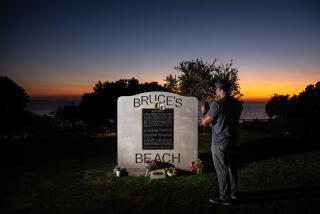Madoff’s sorry apology
- Share via
Bernard Madoff’s apology was all we could have asked for. It wasn’t halfhearted or mealy-mouthed. He accepted responsibility for his actions and didn’t slip in any caveats, justifications or self-exculpatory asides.
“I’m sorry,” the 71-year-old convicted swindler said, turning around in the courtroom to face his victims. “I live in a tormented state now, knowing of the pain and suffering that I’ve created.”
Great. Except for one little problem. The apology came after he was caught -- after a decade spent reaping the benefits of his fraud, benefits that included a Manhattan penthouse, shares in two private jets, a beachfront house in the Hamptons and a yacht off the French Riviera. And the apology came just before his sentencing -- immediately before U.S. District Judge Denny Chin was to decide whether to give him the maximum sentence of 150 years.
It seems an understatement to suggest that Madoff’s credibility is compromised. Beginning in the early 1990s and continuing until his own children turned him in last December, he perpetrated one of the largest frauds in American history; hundreds of investors lost at least $13 billion. And now he wants us to know how awful he feels about it?
Chin, to his credit, was not taken in. He called Madoff’s crimes “spectacularly evil” before handing down the sentence. Chin said he didn’t believe Madoff had done all he could to help prosecutors and trustees identify the stolen funds, and he cited a letter from an elderly victim in which she described how, after her husband died, Madoff put his arm around her “and in a kindly manner told her not to worry, that the money is safe with me.”
We don’t doubt Madoff when he says that his wife cries herself to sleep every night, or even when he describes the torment he lives with (now that it’s out in the open). But we are growing tired of being apologized to by politicians, athletes, corporate chieftains and financial wizards for their various scandals, crimes and misjudgments only after their luck has run out. Ordinary people are required to make ethical decisions each day about what is acceptable behavior and what is not. By and large, they make those decisions before they act, not after they’re caught. Is it too much to expect the same from people who ought to be our role models?
More to Read
Sign up for Essential California
The most important California stories and recommendations in your inbox every morning.
You may occasionally receive promotional content from the Los Angeles Times.













